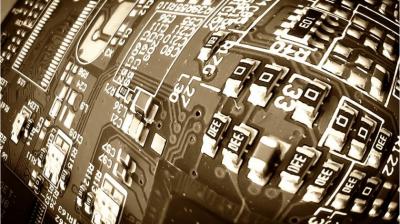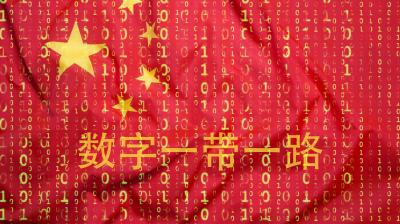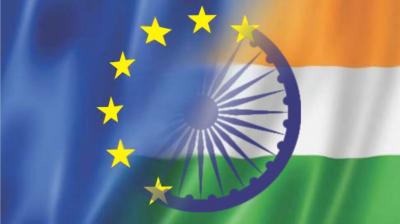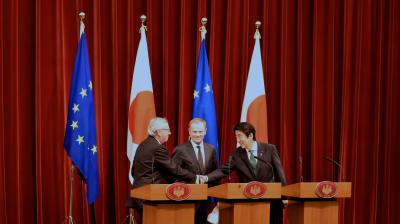EU-Republic of Korea digital connectivity: United,we must stand
This piece by Clingendael researchers Brigitte Dekker and Maaike Okano-Heijmans is part of the compilation EU-Korea convergence and partnerships 10 years after the EU-ROK FTA, in the post Covid era and within the US-China trade war' published by the Asia Centre.
In their June 2020 videoconference, leaders of the European Union (EU) and the Republic of Korea (ROK) emphasised the need for a human-centered digitalisation. The Fourth Industrial Revolution and the global digitalisation have been accelerated by the COVID-19 pandemic. As governments started to (co)create and introduce digital tools to contain the virus, they were forced to take a stance on their prioritization of national interests – be it privacy/individual freedom, public health, business/competitiveness or security. By reiterating the need for a transparent, open and democratic approach to mitigate the potential risks of the accelerated digitalisation, the EU and ROK displayed a like-minded attitude and a strong commitment to addressing global challenges in the digital domain, such as the use of personal data and ethical questions concerning Artificial Intelligence.
As the pandemic continues, Beijing’s aim to become more technologically independent through its Made in China 2025 (MiC2025) policy has been more relevant and visible than ever. Today, Beijing is preparing to complement its MiC2025 with a new ‘China Standards 2035 plan’, a blueprint to write global standards for the next generation of technology. In doing so, Beijing is well on its way to establish itself as a leader in the digital age, with Chinese characteristics. This paper discusses the impact of MiC2025 and China Standards 2035 for the EU and ROK, as well as digital cooperation between the two partners, and offers avenues for enhancing EU-ROK cooperation in this burgeoning field.
"The ROK can be considered one of the EU’s closest international partners, as it is the only country to have economic, political and security agreements with the EU in effect."
The ROK can be considered one of the EU’s closest international partners, as it is the only country to have economic, political and security agreements with the EU in effect. While the partnership has yet to reach its full potential, it is strongly underpinned by the EU-ROK Strategic Partnership and Framework Agreement of 2010, the 2011 Free Trade Agreement and the 2014 Framework Participation Agreement for EU crisis management operation. Furthermore, the EU and ROK have shared values on major political and global issues such as human rights, climate change and upholding the international multilateral rule-based system. This is important, as the two partners today wish to push back on China’s techno-nationalism, as well as on US’ pressure on its allies to side with it in order to curb China’s power. Set against this bigger context and considering this convergence in approaches, objectives and priorities, the EU and ROK stand to benefit from a united approach to digital challenges.
This paper will first elaborate on China’s international efforts in the digital field, and the impact of its key initiatives China’s MiC2025, China Standards 2035 and the Digital Silk Road (DSR) on the foreign policy interests and objectives of the EU and ROK. Secondly, a key subfield where cooperation between the EU and ROK is already going strong will be discussed: data transfers. Both the EU and the ROK struggle to gather and build the data needed to nurture new tech start-ups and advance existing tech- and e-commerce companies, while upholding a human-centred approach. The adequacy talks between the EU and ROK show the willingness to join forces in this area. Thirdly, two promising avenues for further EU-ROK cooperation will be presented: the commercialisation of innovation and digital Official Development Assistance (ODA). Taken together, the paper shows the urgent need, the state of play, and future potential for EU-ROK cooperation and coordination in the digital field.
China Standards 2035: a logical yet ambitious consequence of MiC2025
Since 2015, Beijing’s MiC2025 state-led industrial policy nurtured China’s manufacturing industry, intending to achieve self-sufficiency in high-tech industries by 2025 and overtaking the dominant Western prowess in global high-tech manufacturing by 2049. Inspired by the German government’s Industry 4.0 development plan, Beijing’s focus is on rapid development in technological sectors central to the fourth industrial revolution, such as Artificial Intelligence (AI), advanced robotics, and semiconductors. MiC2025 has become symbolic of China’s aim to become a global leader – both economically and politically. Concerned by the international criticism the plan drew, Chinese officials have minimized reference to MiC2025 since 2018.
While MiC2025 is still being implemented, the Chinese government in 2020 is about to adopt a new plan that synergizes with but extends beyond the aims of MiC2025: China Standards 2035. The official report has not yet been released to the public, but its draft versions reveal an ambitious plan to write global standards for the next generation of technologies. China Standards 2035 builds upon MiC2025, as global standard-setting requires that domestically nurtured tech companies transfer Chinese preferences to other countries and institutions. The Digital Silk Road (DSR), the digital equivalent of the Belt and Road Initiative (BRI), is instrumental to this end. Essentially, the DSR combines the domestic push to export Chinese technologies developed with assertive industrial policies, with a broader agenda to augment interoperability and compatibility between Chinese and overseas technological networks, on Chinese terms. Increased participation in multilateral organisations, especially the World Trade Organisation (WTO) and the International Telecommunication Union (ITU) is also a crucial element of China’s aspirations to dominate in the digital field. While responding to a significant and growing need for digital solutions in developing economies, the export of Chinese technology also means export of Chinese standards underpinning these new technologies.
The advancement of MiC2025, the introduction of China Standards 2035 and the spread of Chinese digital standards through the DSR are a matter of concern among developed economies. These concerns can be linked to a new trend of techno-nationalism – the idea that innovation and technological development are directly linked to a nation’s security, economic prosperity and social stability. This trend is poised to fundamentally alter geopolitics and global commerce, as already visible in the politicization of global technical standards and the fear for global decoupling. In order to withstand and mitigate the effects of a rising China – and the withdrawal of the US from multilateral institutions – the EU and the ROK need to find new avenues for cooperation, including in the digital field. Cooperation in the fields of data transfer, the commercialisation of innovation and digital ODA is particularly promising.
Digital standards with Chinese characteristics are exported to third countries through the DSR, raising concerns among supporters of a free, open and inclusive internet, especially in developed economies. Set against this context strengthened and comprehensive cooperation between the EU and the ROK on digital regulation and commercialization of technologies is required to uphold shared values and to offer emerging economies an alternative to Chinese norms and standards.
Data: the oil of the digital economy
Data is considered as the oil of the digital economy, fuelling the growth of existing and new tech companies globally. The COVID-19 pandemic and the use of digital tools to contain the virus by gathering, sharing and transferring (personal and anonymised) data has focused attention also on the potential (mis)use of data collections by private organizations and governments. The digital instruments used may have far-reaching consequences for individuals’ privacy not only during the pandemic – when most see a necessity to implement the instruments – but also in the longrun. To secure citizens’ privacy, citizens and civil society organisations have to be careful that digital tools to combat the virus, such as mass surveillance, are not normalized during the extraordinary times of a lockdown. In the debate around processing personal data, the EU, the US and China represent three dominant focus areas: privacy, business interests and national security respectively.
"The US focuses on minimizing data regulation, arguing regulation would hurt business potential."
The US focuses on minimizing data regulation, arguing regulation would hurt business potential. US regulation is scattered in many laws with narrow scopes. For its part, China initially followed the US by introducing sector-specific laws, but in 2016 introduced the Cybersecurity Law (CL). This law, and the non-binding guidelines accompanying it, displays a stricter and more comprehensive approach similar to the EU. The Chinese characteristics and focus on national security in the CL are primarily found in the much broader definition of sensitive data compared to the EU’s definition, the inclusion of data localization provisions and the establishment of the principle of cyber-sovereignty.
The EU centralized individuals’ data protection in a comprehensive data privacy law framework, originally in its Data Protection Directive of 1995, which in 2016 was carried over with minor changes into the General Data Protection Regulation (GDPR). The GDPR allows EU-citizens to request the contents of their digital trail and have the right to demand that their trail be deleted. This process is overseen by an independent non-governmental organisation. Besides the strict privacy focus, rather than a business or national security focus, the GDPR differs from the US and Chinese approaches in that it requires that not only companies based in the EU, but also foreign companies processing data from EU citizens adhere to the GDPR’s strict provisions. This extraterritorial dimension puts a higher burden also on foreign (e-commerce) companies, as additional security measures have to be implemented if EU data are being processed and stored.
To overcome the lack of data regulation interoperability between the EU and foreign markets, the EU introduced a mechanism to assign countries as ‘adequate’. Adequacy implies that the country in question upholds similar levels of data protection as the EU and therefore, its data can be handled as intra-EU data and thus no further safeguard is necessary.
While only a few countries have obtained full adequacy status from the EU, currently, only the ROK is involved in adequacy talks with the EU. Showing its willingness to obtain the adequacy status, the Korean government amended its three major data privacy laws in 2020. In the light of EU-ROK partnership, and considering the fact that the ROK is the only country that has political, economic and security agreements with the EU in effect, the free flow of data is an piece of the puzzle that is still missing.
Withal the more since e-commerce and e-services have skyrocketed due to the COVID-19 crisis, an adequacy decision will be welcomed by Korean companies doing business in the European Single Market and vice versa. Once the adequacy decision is made, companies only have to deal with one unified regime, instead of 28 different regimes having purview over data protection. This will save additional compliance costs and time-consuming authorizations when entering an EU member states’ digital market. In addition, European citizens will enjoy an enhanced level of protection when their data are transferred to the ROK. Set against the context of MiC2025, China Standards 2035 and the DSR, increased digital cooperation through an adequacy decision for South Korea is also opportune in the competition with Chinese companies.
At the EU-Korea leaders’ summit that marked the 10th anniversary of the strategic partnership, digital matters were at the forefront. European Council President Charles Michel, European Commission President Ursula von der Leyen and Korean President Moon Jae-in emphasized the need for enhanced digital cooperation, including a High-Level Dialogue on the digital economy.
Clearly, an adequacy decision would confirm the shared human-centred approach of the EU and ROK, illustrating also the importance both partners attach to furthering individual privacy and online transparency and freedom as digital values. Furthermore, the shared understanding of data protection eases the launch of a dialogue on the digital economy . The convergence on data protection thus paves the way for practical cooperation in the field of research and development, innovation and the e-economy – domains that heavily depend on data. Also, the increased data transfer possibilities will provide European and South Korean tech companies with the necessary data to grow and gain commercial leverage against Chinese and US Big Tech companies.
Broadening digital cooperation: commercialization and digital ODA
Beyond the adequacy talks and data protection, two promising paths for broader and deeper EU-ROK cooperation in the digital field stand out – namely, commercialization of innovation and digital ODA.
The commercialization of innovation
The first avenue for increased cooperation concerns the shared challenge of commercializing innovation. The EU and ROK have a strong tradition in academic research but are presently lacking in the start-up and scale-up of digital business ventures, especially when compared to the US and China. In the business development phase, when companies take the leap from innovation to commercialization, vast financial resources are required. In the EU and ROK, however, a lack of risk capital in new research ideas forces companies to search financial backing abroad. Oftentimes this includes relocating to either the US or China. Secondly, in the growth stage companies need additional financial resources to scale-up their companies to serve a global market. In contrast to the US- and China-based start-ups – which serve huge markets with – scaling up within the EU or outside of the ROK also creates language and market focus challenges. National champions have difficulties entering foreign markets and are prone to take-overs from large companies that are willing to invest financially.
The ROK and EU member states are now creating awareness at home about the need to become an innovation leader rather than a fast follower once a technology has been commercialized. In the ROK, the Korea Advanced Institute for Science and Technology (KAIST) plays an important role herein, as it manages funds to financial support start-ups and commercialization purposes deriving from research at KAIST. Next to this, an increasing number of universities are offering entrepreneur classes in addition to existing research-focused education.
Facing the same challenge ahead, the EU and the ROK governments would do well to further best practice sharing among universities as well as closer cooperation between universities, business representatives and successful start-ups to discuss the commercialization of innovation. By tackling this challenge together, they can not only address the difficulties in the start-up phase but also the scale-up phase. Moreover, creating a network of start-ups in the EU and ROK, is likely to encourage EU-based start-ups to scale-up towards ROK more quickly and vice versa. Such networks can also help overcome language and bureaucratic barriers that may otherwise keep start-ups from entering the EU or ROK market.
Digital ODA
The ROK and the EU and its member states stand to benefit also from joining forces in the field of digital ODA. In short, digital ODA entails technical assistance by strategic and practical objectives in digital connectivity’s three strands: telecommunications infrastructure, regulation and business. Europe’s global pillar in its February 2020 digital strategy, and its new Neighbourhood, development and international cooperation Instrument (NDICI) focus on promoting an inclusive, transparent and human-centred digital environment in Europe’s backyard and beyond. For its part, South Korea’s ODA has since 2009 – when it joined the OECD Development Assistance Committee – primarily focused on reducing the digital divide. This mainly involves technical assistance, transfer of economic development experience and aiding the development of Information and Communication Technology industries of recipient countries, primarily in Asia. An excellent example of this assistance is South Korea’s Overseas Infrastructure Development Support Corporation (KIND) that aims, among other things, to improve 5G networks in ASEAN countries and India through the 2019 5G+ ‘Strategy for the Realisation of Innovation and Growth’ initiative. Also, the Korean government initiated the Cybersecurity Alliance for Mutual Progress (CAMP). This network serves as a platform to actively offer technical assistance and share best practices in the area of cybersecurity especially in Africa, Central Asia and Latin America.
In April 2019, during the 7th ROK-EU Policy Consultation on Development Cooperation (7th PCDC), both parties emphasized the need to continuously strengthen the EU-ROK partnership in the field of international development cooperation in Asia and Africa. Even though a variety of items and avenues for cooperation were discussed, digital ODA cooperation was not mentioned. Now, the forced global acceleration of digitalisation as a consequence COVID-19 pandemic, the deepening Sino-American trade-tech war, and China’s assertiveness in the digital domain through its DSR add urgency to EU-ROK coordination on digital ODA.
Commitments made during the 7th PCDC concerning increased bilateral cooperation in Asia, the Pacific and Africa, including by way of joint cooperation projects, could well focus on digital ODA. The EU and ROK may complement each other in their own backyard – the ROK focusing on Southeast Asia, and the EU on its own neighbourhood – and can improve their own action through best practice learning. The two partners can undertake projects that include regional business and civil society organisations to increase digital inclusion and access to free and open internet.
Conclusion
The ambition and intentions of the MiC2025, the DSR and China Standards 2035 prompted developed countries to reconsider their own industrial policies – both defensive and offensive – and regulatory policies, with an eye to maintaining the technological advantage they still hold over Chinese companies. The COVID-19 outbreak only confirmed the dependence of citizens on technological solutions and prompted a global discussion on data, privacy and the dependence of countries in supply chains.
The EU and the ROK adopted a human-centered approach that puts privacy central in their policies. If the EU adopts an adequacy decision in respect of the ROK, this will enable their companies to transfer and process data on equal terms. That in turn will not only enhance business between the partners, but also strengthen the ability of both sides to nurture tech companies and increase research and development cooperation between companies creating economic leverage to withstand the Chinese (and the US) prowess. In addition to this ongoing cooperation, the EU and ROK can enhance their cooperation on the commercialization of innovation and digital ODA. Both efforts will help to strengthen the EU’s and ROK’s global digital position, reduce the digital divide and offer countries an alternative to the DSR.
"The commercialization of innovation and digital ODA are two subfields that offer great opportunities to further cooperation."
Overwhelmed by the technical opportunities and challenges that the Fourth Industrial Revolution and the digital era present, like-minded countries need to bind forces, aligning their policies to (co)create international leverage towards China and the US. Amid the US–China tech rivalry, the EU and the ROK need to be more assertive in defending their own economic and strategic interests and promoting shared norms. The two sides are already connected through strong economic, political and diplomatic ties. Now, a broader agenda for cooperation in the digital field must be devised, and institutionalized in the agreed High-Level Dialogue on the digital economy. The commercialization of innovation and digital ODA are two subfields that offer great opportunities to further cooperation. Only united, can the EU and ROK, together with like-minded partners, help to deliver inclusive and sustainable growth in third countries, while also serving their own economic and strategic interests.
Follow @BrigitteDekker_, @MaaikeOh and @Clingendaelorg on Twitter.










